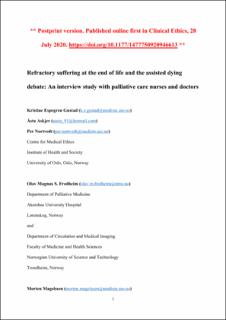| dc.contributor.author | Gustad, Kristine Espengren | |
| dc.contributor.author | Askjer, Åsta | |
| dc.contributor.author | Nortvedt, Per | |
| dc.contributor.author | Fredheim, Olav Magnus | |
| dc.contributor.author | Magelssen, Morten | |
| dc.date.accessioned | 2021-02-12T08:17:16Z | |
| dc.date.available | 2021-02-12T08:17:16Z | |
| dc.date.created | 2021-01-15T15:40:11Z | |
| dc.date.issued | 2020 | |
| dc.identifier.citation | Clinical Ethics. 2020, . | en_US |
| dc.identifier.issn | 1477-7509 | |
| dc.identifier.uri | https://hdl.handle.net/11250/2727591 | |
| dc.description.abstract | Background
How often does refractory suffering, which is suffering due to symptoms that cannot be adequately controlled, occur at the end of life in modern palliative care? What are the causes of such refractory suffering? Should euthanasia be offered for refractory suffering at the end of life? We sought to shed light on these questions through interviews with palliative care specialists.
Methods
Semi-structured interviews with six nurses and six doctors working in palliative care in five Norwegian hospitals. Transcripts were analysed with systematic text condensation, a qualitative analysis framework.
Results
Informants find that refractory suffering is rare, and that with palliative sedation satisfactory symptom control can nearly always be achieved at the end of life. However, the process of reaching adequate symptom control can be protracted, and there can be significant suffering in the meantime. Both somatic, psychological, social and existential factors can contribute to refractory suffering and potentiate each other. However, informants also place significant weight on factors pertaining to the organization of palliative care services as contributing to insufficient symptom control.
Conclusions
If refractory suffering is indeed rare, then this arguably weakens a common prima facie argument for the legalization of assisted dying. However, the process of reaching adequate symptom control can be protracted and involve significant suffering. The experiences of palliative care clinicians constitute important empirical premises for the assisted dying debate. The study points to several areas in which palliative care can be improved. | en_US |
| dc.language.iso | eng | en_US |
| dc.publisher | SAGE Publications | en_US |
| dc.rights | Attribution-NonCommercial-NoDerivatives 4.0 Internasjonal | * |
| dc.rights.uri | http://creativecommons.org/licenses/by-nc-nd/4.0/deed.no | * |
| dc.title | Refractory suffering at the end of life and the assisted dying debate: An interview study with palliative care nurses and doctors | en_US |
| dc.type | Peer reviewed | en_US |
| dc.type | Journal article | en_US |
| dc.description.version | acceptedVersion | en_US |
| dc.source.pagenumber | 0 | en_US |
| dc.source.journal | Clinical Ethics | en_US |
| dc.identifier.doi | 10.1177/1477750920946613 | |
| dc.identifier.cristin | 1872285 | |
| dc.description.localcode | © 2020. This is the authors' accepted and refereed manuscript to the article. This manuscript version is made available under the CC-BY-NC-ND 4.0 license http://creativecommons.org/licenses/by-nc-nd/4.0/ The final authenticated version is available online at: https://doi.org/10.1177%2F1477750920946613 | en_US |
| cristin.ispublished | true | |
| cristin.fulltext | postprint | |
| cristin.qualitycode | 1 | |

